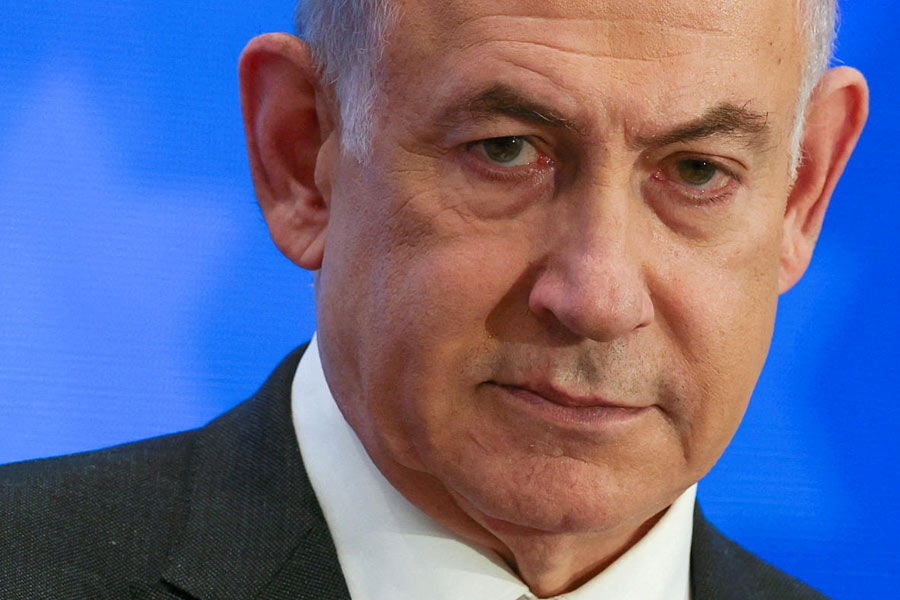Israel will make its own decisions about how to defend itself, Prime Minister Benjamin Netanyahu said on Wednesday, as Western countries pleaded for restraint in responding to a volley of attacks from Iran.
The United States, European Union and G7 group of industrialised nations all announced plans to consider tighter sanctions on Iran, seen as aimed at mollifying Israel and persuading it to rein in its retaliation for the first ever direct Iranian strikes after decades of confrontation by proxy.
Iran attacked in retaliation for a suspected Israeli airstrike on its embassy compound in Damascus on April 1. Israel and its allies mostly shot down all missiles and drones and there were no deaths, but Israel says it must retaliate to preserve the credibility of its deterrents. Iran says it views the matter as closed but will retaliate again if Israel does.
Israel's Air Force said late on Wednesday its fighter jets had struck the "terrorist infrastructure" of Iran-backed Hezbollah in eastern Lebanon, stoking concerns about a further escalation in clashes across Israel's northern border.
Earlier, Netanyahu met the German and British foreign ministers, who both travelled to Israel as part of a coordinated push to keep confrontation between Israel and Iran from escalating into a regional conflict fueled by the Gaza war.
Netanyahu's office said he thanked Annalena Baerbock and David Cameron for their support, while telling them: "I want to make it clear - we will make our own decisions, and the State of Israel will do everything necessary to defend itself."
Earlier, Cameron said it was now apparent Israel planned to retaliate for the Iranian missile and drone strikes.
Baerbock said escalation "would serve no one, not Israel's security, not the many dozens of hostages still in the hands of Hamas, not the suffering population of Gaza, not the many people in Iran who are themselves suffering under the regime..."
More than six months into the Gaza war between Israel and the Iran-backed Palestinian militant group Hamas that has seen flare-ups across the Middle East, diplomats are searching for a way to avert direct battle between Israel and Iran.
Jordan added to the calls for restraint, warning of a war that could be "devastating" for the region.
"The risks are enormous. That could drag the whole region into war, which would be devastating to us in the region and we’ll have very, very serious implications for the rest of the world including the U.S," Foreign Minister Ayman Safadi said. "The situation is too dangerous. The chances of regional explosion are real, and that has got to stop. We’ve got to make sure there’s no further escalation."
Washington says it is planning to impose new sanctions targeting Iran's missile and drone programme in coming days and expects its allies will follow suit.
EU leaders were due to discuss sanctions at summit in Brussels, as were G7 foreign ministers meeting in Italy.
'Stop the war! Stop the war!'
Since Hamas fighters triggered the war in Gaza by attacking southern Israel, killing 1,200 people and capturing 253 hostages according to Israeli tallies, clashes have erupted between Israel and Iran-aligned groups based in Lebanon, Syria, Yemen and Iraq.
Inside Gaza, Israel has launched a massive air and ground assault, with nearly 34,000 people confirmed killed, according to Palestinian medics, and thousands of others feared dead, still lost among the ruins.
This month, Israel abruptly pulled most of its troops out of southern Gaza, site of most of the heaviest fighting since the start of the year.
Fighting in recent days has been focused in central Gaza, in the Nuseirat refugee camp north of Deir al-Balah, one of the few areas that Israeli troops have yet to storm. Israeli forces retreated from the camp late on Wednesday, residents and some Israeli media said.
At a hospital morgue in Deir al-Balah, members of the al-Nouri family bellowed in sorrow and anger over bodies in body bags, several the size of small children, in video obtained by Reuters. Authorities said 11 people had been killed in an Israeli strike on the family home on Tuesday.
"Oh people of the world, what is happening is wrong! Have mercy on us! Stop the war!... Children are dying in the streets!" a man cried inside the crowded hospital.
In the southern city of Rafah, an Israeli airstrike on a house killed seven Palestinians, including a woman and three children, medics said.
Elsewhere, Hamas media reported Israeli forces had withdrawn from Beit Hanoun in northern Gaza after a 36-hour raid there.
On Israel's northern border with Lebanon, where cross-border battles between Israeli forces and the Iran-aligned Hezbollah movement pose an escalation risk, Hezbollah said it had launched missiles and drones at a military facility in northern Israel in retaliation for Israeli strikes that killed Hezbollah members.
Israel said 14 of its soldiers were hurt in the incident, six of them seriously.
Israel says it will discuss a pause to free hostages but will not stop fighting until Hamas is wiped out; Hamas says it will not release hostages without a truce leading to an end to the war.
Qatar, which has served as mediator, said negotiations were at a delicate phase. It later said it was re-evaluating its own role as mediator, citing concerns that its efforts were being undermined by those pursuing "narrow political interests".
With the prospect of famine looming, the United States and Israel say access for aid has improved this month. But aid agencies say supplies of food and medicine are still too paltry to stave off disaster.
"Across Gaza, a man-made famine is tightening its grip," Philippe Lazzarini, head of the United Nations Palestinian refugee agency UNRWA told the 15-member U.N. Security Council. "In the north, infants and young children have begun to die of malnutrition and dehydration. Across the border, food and clean water wait."











